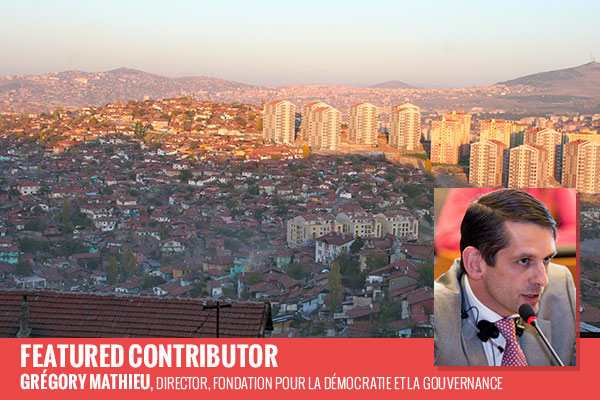
The threats to Turkey are not just external.
Turkey faces many challenges being in the epicenter of global and regional politics. Ankara is under serious pressure with the connivance of its European and American "allies".
Does Turkey Oppress Religious Minorities?[/tweetthis]
But the threats to Turkey are not just external. Organizations like the FETÖ (the Gülenist movement) are trying to build doubts about the government's decisions and provoke insecurity in the society. Others undermine the nation's will and self-respect through unjustified and hypocritical accusations of crimes against humanity and social minorities. One of the examples of such baseless criticism is the on-going hysteria about Turkish "oppression" of Orthodox Christians who get support from the Greek Orthodox "Ecumenical" Patriarchate.
But we should not forget that the Patriarchate has long transformed into a political body rather than a religious organization.
In 1923 when preparing the Lausanne Treaty draft, Turkey suggested moving the Greek Patriarchate to Mount Athos. Istanbul was also ready to extend the number of Greeks who were not subject to the deportation from Turkey so the Patriarchate could retain the ecumenical status and influence in the Orthodox world. But the Greek side rejected the Turkish proposal and the final compromise was introduced by France. According to it, the Patriarchate withdrew the political rights it possessed under the Millet system, and could only provide spiritual guidance to the Orthodox Christians. In its turn, as a proof of its zeal for peace Turkey gave consent to preserve the Patriarchate in Istanbul.
But the Patriarchate didn't comply with its part of the agreement. In the absence of the Orthodox community to fulfill its original purpose, the Patriarchate engaged in international politics.
According to the site of the Greek Orthodox Patriarchate, since January 2016 Patriarch Bartholomew had two meetings with the Greek President and participated in a joint summit with the former US Vice President Joe Biden, and the former Prime Minister of Greece Alexis Tsipras. Moreover, Patriarch Bartholomew attended at least 32 meetings at the ministerial level, mostly with Ministers of Foreign Affairs of five different states. Besides, he met with deputies of Greek Parliament at least 12 times.
The people from the Patriarch's inner circle are also involved in US politics. Some of them, like Michael Karloutsos and until recently Reince Priebus, lobby the interests of Patriarchate in US Department of State and White House. Some criticize US President Donald Trump. Others are constantly complaining to the US State Department about Ankara's oppression of the Patriarchate.
In addition, Patriarch Bartholomew takes advantage of the opportunities to give his assessment of different politicians, including Turkish ones, of course. Furthermore, the Patriarchate conducts a lot of PR work to make foreign policy makers participate in its events and activities such as the Archon International Conference on Religious Freedom.
It was also observed that owners of large international corporations visit Bartholomew. The Patriarch and those close to him maintain good personal relationships with the heads of active multinational corporations, for example, Muhtar Kent (Chairman in Coca-Cola), George and Nicolas Logothetis (CEO and Chairman in Libra Group respectively), etc.
As it turns out, Patriarch Bartholomew is a prominent figure in contemporary politics. His magnitude is not equal to the Pope's, of course, but foreign leaders often refer to him rather than to the President Erdogan.
Let's consider president of Ukraine Petro Poroshenko, for example. In his parliament speech in September he didn't mention Turkey, but surprisingly he mentioned Patriarch Bartholomew with regard to an official letter to the hierarch. Also this year, both Ukrainian President, Prime Minister and Parliamentary Speaker personally met with Bartholomew. And do they demonstrate such strive for contacts with our government?
It's important to say, that Bartholomew is walking the same path as his predecessor. Thus, in 1990 Patriarch Dimitrios met with US President Bush and held a speech in Congress where he touched upon the actual political problems and received various awards from the Greek-American lobby.
His visit took place in a very strained period of relations between Washington and Ankara, when the US severely neglected the rules of diplomatic protocol when accepting a high-profile Turkish delegation.
Of course, it provoked an intense reaction of the Turkish Foreign Ministry. Turkey's Ambassador to Washington Nuzhet Kandemir did not attend the dinner devoted to the Patriarch and organized by the Department of State. He also suggested conducting an investigation about Dimitrios's actions.
Indeed, do religious minorities have the right to meddle in global politics and thus affect the social-political situation of the country and people that accommodate them? How can the Fanariots be so ungrateful?
It is only logical that Turkish people are sometimes tempted to banish the Patriarchate from the country. For example, maybe the proximity to a vast American Orthodox community, supporting US politicians and businessmen could help Bartholomew to better defend the interests of the congregation?
Or on the contrary, maybe we should use the Patriarchate in the community’s best interests? The Patriarch's contacts and influence could serve Turkey but in this case he should play by the rules and his actions must comply with national politics. At least he should stop undermining our political ties with the Turkey’s strategic partners abroad.
As we have seen, the Greek Orthodox Patriarchate has become a hostage of its own politics. From the moment of signing the Lausanne Treaty, Turkish government is committed to fulfilling its obligations: providing equal conditions for all confessions without interfering with their religious matters. Moreover, Turkish government demonstrates great patience and calls for dialogue through constructive comments on the critical issues without taking rigorous measures.
However, one cannot help wondering how Western politicians and media manage to distort the facts in order to demonize Turkey in the eyes of the world.
